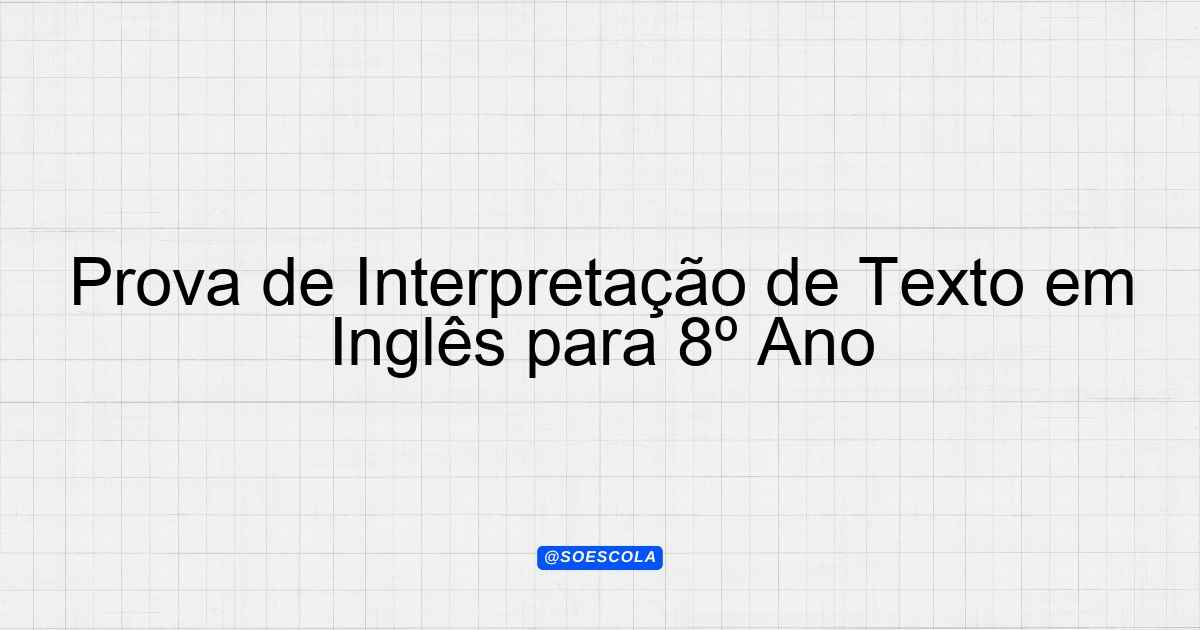Prova de Interpretação de Texto em Inglês para 8º Ano
Tema: INTERPRETAÇÃO DE TEXTO
Etapa/Série: 8º ano
Disciplina: Língua Inglesa
Questões: 15
Prova de Interpretação de Texto – Língua Inglesa
Aluno(a): _______________________
Data: ____/____/______
Professor(a): ____________________
—
Instruções:
Leia atentamente cada questão e assinale a alternativa correta. As perguntas abordam a interpretação de texto e exigem compreensão, análise e raciocínio crítico.
Texto para interpretação:
*Read the following text and answer the questions below:*
The Importance of Reading
Reading is an essential skill that provides numerous benefits. It enhances vocabulary, improves concentration, and stimulates creativity. Moreover, reading can transport individuals to different worlds, allowing them to experience diverse cultures and perspectives. Engaging with texts is not just a pastime; it’s a way to expand one’s knowledge and understanding of the world.
—
Questões:
1. According to the text, which of the following is NOT mentioned as a benefit of reading?
– a) Improves concentration
– b) Provides physical exercise
– c) Enhances vocabulary
– d) Stimulates creativity
2. What does the phrase “transport individuals to different worlds” mean in the context of the text?
– a) Traveling physically to other countries.
– b) Allowing people to explore new ideas and cultures through reading.
– c) Reading about various historical events.
– d) Experiencing different weather conditions.
3. Which word in the text indicates an increase in knowledge?
– a) Essential
– b) Expand
– c) Stimulate
– d) Transport
4. The main idea of the text can be summarized as:
– a) Reading is a hobby.
– b) Reading is an important skill with many benefits.
– c) Reading is only useful for students.
– d) Many people do not enjoy reading.
5. In what ways can reading enhance a person’s vocabulary?
– a) By introducing new word forms.
– b) Through social interactions during reading.
– c) By ignoring complex words.
– d) By reading only comic books.
6. Which of the following statements reflects a critical interpretation of the text?
– a) Everyone finds reading enjoyable.
– b) Reading has no impact on creativity.
– c) Regular reading habits can significantly enrich one’s life.
– d) Reading is better than watching television.
7. What does the author imply about the relationship between reading and cultural perspectives?
– a) Reading limits cultural perspectives.
– b) Reading only reflects one culture.
– c) Reading helps understand various cultures.
– d) Cultural learning is superior to reading.
8. If someone wanted to argue against reading, which argument would contradict the text’s claims?
– a) Reading enhances knowledge.
– b) Reading develops creativity.
– c) Reading can be time-consuming and less stimulating than other activities.
– d) Reading improves vocabulary.
9. What tone does the author use in the text?
– a) Sarcastic
– b) Persuasive
– c) Informative
– d) Critical
10. Which of the following can be a consequence of not engaging with reading, according to the text’s implications?
– a) Greater concentration levels
– b) Limited vocabulary and knowledge
– c) Increased creativity
– d) Better understanding of different cultures
11. How can one practically apply the benefits of reading mentioned in the text?
– a) By discussing books with friends.
– b) By reading only magazines.
– c) By avoiding challenging texts.
– d) By watching movies based on books.
12. What is the significance of the word “essential” in describing reading?
– a) It indicates that reading is uncommon.
– b) It shows that reading is of secondary importance.
– c) It suggests that reading is necessary for personal development.
– d) It implies that reading is optional.
13. How can reading shape one’s identity according to the text?
– a) By making one more opinionated.
– b) By expanding one’s experiences and understanding.
– c) By limiting exposure to different ideas.
– d) By reinforcing existing beliefs.
14. Based on the text, which of the following activities could be considered a good complement to reading?
– a) Engaging in debates about books.
– b) Watching television instead of reading.
– c) Ignoring diverse points of view.
– d) Reading only fiction genres.
15. Which statement best reflects the purpose of the article?
– a) To criticize people who do not read.
– b) To promote the habit of reading for personal growth.
– c) To provide a list of favorite books.
– d) To share the author’s personal reading experiences.
—
Gabarito:
1. b – O texto não menciona que ler proporciona exercício físico.
2. b – Significa permitir que as pessoas explorem novas ideias e culturas através da leitura.
3. b – “Expand” indica um aumento no conhecimento.
4. b – A leitura é uma habilidade importante com muitos benefícios.
5. a – A leitura apresenta novas palavras.
6. c – Afirma que hábitos de leitura enriquecem significantemente a vida de uma pessoa.
7. c – Sugere que a leitura ajuda a entender várias culturas.
8. c – Isso contradiz os benefícios listados no texto.
9. c – O tom é informativo, com objetivo de destacar benefícios da leitura.
10. b – A falta de leitura pode limitar vocabulário e conhecimento.
11. a – Discutir livros pode ajudar a aplicar benefícios da leitura.
12. c – “Essential” indica que a leitura é necessária para o desenvolvimento pessoal.
13. b – A leitura pode ampliar experiências e entendimento.
14. a – Debater sobre livros é um bom complemento à leitura.
15. b – O propósito do texto é promover o hábito da leitura para crescimento pessoal.
—
Considerações Finais:
Esta prova visa avaliar a capacidade dos alunos do 8º ano em interpretar e compreender textos em Língua Inglesa, desenvolvendo suas habilidades de raciocínio crítico e análise textual, conforme orientações da Base Nacional Comum Curricular (BNCC).




